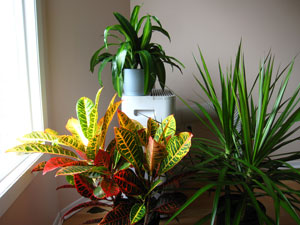What’s bugging your indoor greenery?
So you have indoor plants to keep your green thumb happy throughout the winter season. Great! They clean the air and look fantastic. But have you taken a close look at them lately? Go ahead and do that right now. Find anything suspicious? If not, great! But if you did, your plant may be suffering from an insect infestation, or perhaps just the beginning of one.
Here is a little information on three common insects that affect indoor plants and what you can do to combat them.
Mealy Bugs
They are soft-bodied and range in colour but what you are most likely to see is the white fuzz the insect uses for protection. These will be found in nodes between stem-to-stem and leaf-to-stem junctures. Because mealy bugs feed on plant juices, the plant’s leaves will turn yellow and eventually die.
Remedy
1. Insecticidal soaps (I use Green Earth)
2. Can introduce predator insects (ladybugs)
Whiteflies
These tiny, heart-shaped insects are white and capable of flight. You will see them under the leaves of the plants or in a swarm around the plan. It is actually the nymphs and larval stages that are damaging to plants as they feed on the soft tissues. Like aphids, whiteflies secrete a honeydew that makes your plant more susceptible to fungus problems.
Remedy
1. Sticky traps can be effective for catching adults but eggs will remain
2. Neem oil applications
3. Insecticidal soaps
Mites
You may be familiar with mites, especially if you are growing apples or cherries. Spider mites are among the most common and you will notice a fine webbing long before you see any mites. A closer look will reveal tiny white specks. Feeding on plant juices, the mites leave behind a trail of destruction often followed by bronzed leaves.
Remedy
1. Hose off or wipe down the entire plant.
2. Neem oil may be effective to reduce populations.
2. Dispose of heavily infested plants to avoid contamination of other plants.
Finally:
1. Inspect before you buy. A few small insects on one plant can quickly grow into thousands.
2. Quarantine new plants for two weeks before moving them in with others.
3. Be observant. It’s easier to fix the problem before it gets out of control.




